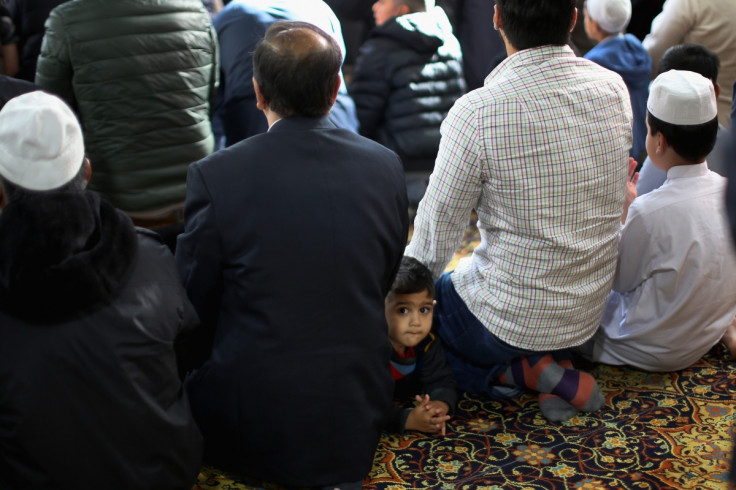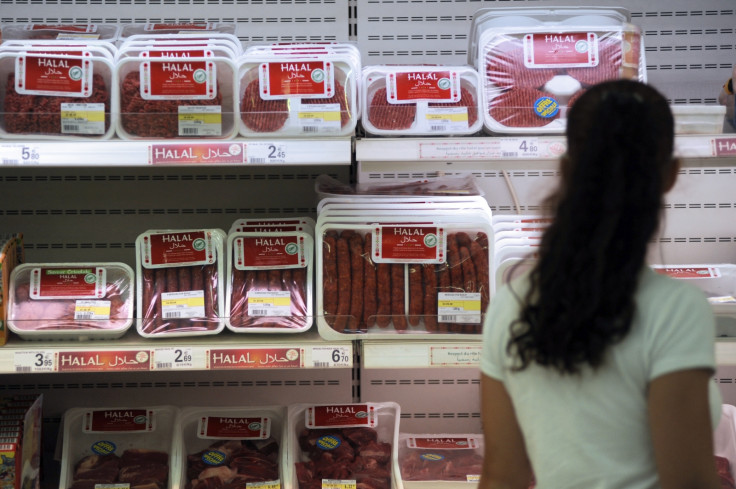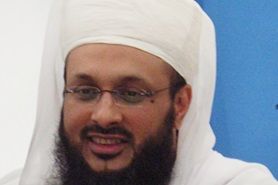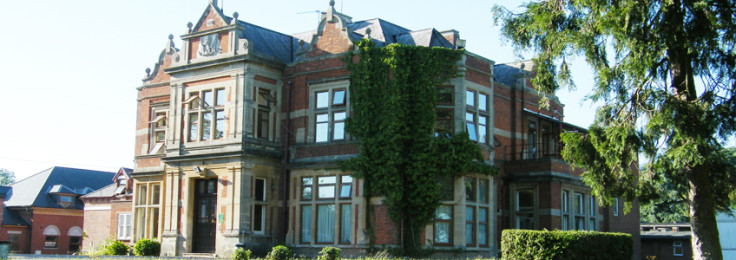Sharia law UK: 'Ban Sharia? Say goodbye to chicken tikka masala' says Muslim leader

As the sun sets over the rolling green hills of the West Midlands, a black gate slowly opens giving way to a long gravel drive lined with trees. Here, on the outskirts of the drab commuter town of Nuneaton, is Britain's biggest Sharia court where – many believe – Muslim judges enforce Islamic law on British soil.
Inside, Sheikh Faiz-ul-Aqtab Siddiqi sits behind a desk in his large office, surrounded by Quranic texts and cradling his baby daughter, Nabihah, in his arms. Branded a "hard-line cleric" in a prominent daily newspaper just weeks ago, he speaks in a posh – almost plummy – English accent tinged with the twang of his native Coventry.
"What [they] want to do is titillate [their] readers and sell a good story. We have British judges as part of this tribunal. We have barristers, solicitors, women, and professional people on the panel. We are not some backstreet Sharia council. It is a cheap shot," says Siddiqi.
Inside Britain's Sharia courts, an IBTimes UK investigation

In a series of exclusive interviews and features this week, IBTimes UK investigates the scope and role of Islamic Sharia courts in Britain.
Speaking to Islamic scholars in London and the Midlands, pro-and anti-Sharia activists, politicians and British Muslims, this series explores the true role of Sharia councils and courts in Britain.
He launched the Muslim Arbitration Tribunal (MAT) in 2007 some 15 years after his father, renowned Sufi Muslim scholar Hazrat Mujadid Abdul Wahab Siddiqi, founded Hijaz Manor on the site of a former college here in the mid-1990s. It was originally designed to train imams but today is better known for MAT, which bills itself as an alternative dispute resolution centre based on Islamic, or Sharia, law.
The controversy around MAT has been that unlike the bulk of Sharia courts in Britain, many of which are low level operations linked to mosques or local imams, its decisions have legal standing under the 1996 Arbitration Act. The bulk of its work – some 80% – is ruling on Muslim marriages, but it also handles commercial and property disputes in accordance with Sharia law, which has rightly or wrongly been accused of being sexist.
Sharia law is once again in the spotlight in 2016 as newspapers carry exposes on cases where women are treated unfairly by judges or in some cases persuaded not to pursue cases against abusive husbands. Home Secretary Theresa May has announced an independent review into what has been dubbed "a parallel court system" that threatens the over-arching power of Britain's courts – even British society at large.
"It is complete and utter nonsense," scoffs Siddiqi. "Beth Din [the Jewish religious court] has existed for a century now and when did that ever become a threat to British society? And the guys sitting at Beth Din look even more medieval than I do, with their long beards and their caps and their archaic buildings.
"What about ecclesiastical courts [and the] hundreds of other tribunals out there – professional, industrial, all sorts. Are they a threat to the British way of life? Have they become a parallel system? No. So why is it just Muslims? It is Islamophobia. It is exactly the same intolerance that Isis and al-Qaeda and these guys preach."
Ultimately history tells us that this kind of nonsense will only prevail up to a certain point
Siddiqi's defence of MAT is simple: it provides 3.5 million British Muslims with a legal structure by which they can live their lives in accordance with their faith. Many of their clients are third or fourth generation British Muslims like himself, who in the past would have had to consult local and often inexperienced imams if they wanted a ruling on Islamic law, MAT simply provides them with a more established option.
"That this country does not offer Muslim people the services they require in line with their faith. I think is repugnant to the idea of British citizenship. So we set up MAT; but rather than setting it up as a back-of-a-grocery-shop Sharia council, we set it up under the Arbitration Act. We wanted to do it properly," he said.
"[The backstreet Sharia councils] are only there because we weren't there. If everyone got behind us then these courts would become redundant. This was never about creating something that set us apart in British society, this was about offering a required service to young Muslims. We have female mediators we deal with all sorts of people and I challenge anyone to find someone who is unhappy with our service."

Siddiqi understands the criticism of what he calls back-of-a-grocery store tribunals and even says he would not oppose some sort of red tape or bureaucracy imposed by the government to ensure that they are up to scratch ("If that ups their game, so that they become a good players, [then] great, we welcome that," he said). But he does not accept that Sharia has an image problem or that it needs to better represent itself given current hostility.

"People have been eating Sharia for the last 35 years. Halal food [is] Sharia. Chicken tikka masala is the top number one dish in this country and that has never become a threat to British culture, has it? It is more popular than fish and chips – the number one dish in this country and 90% of it is halal. So will people start asking Cameron to protect them against chicken tikka masala?" he asks.
"Animals were slaughtered in abattoirs for centuries before stunning and electrocution. If people have changed their ways and others haven't then that is the beauty of our country and the way we live. I'll carry on doing what I do and you do what you do. How can the way that I slaughter an animal affect you?"
I believe that there are hawks but there are doves as well. The hawks may have it one day but the doves will another time. And when that day comes we will go to those doves and we will say: can we do anything to help you?
Siddiqi grew up in Coventry, a few miles from Nuneaton, at a boys school that he claims was one of the roughest in the city. "When I grew up we had skinheads and mods and running fights between black and skinheads, you know. Every day somebody was stabbed," he recalls. But like the gangs of children who used to drive up to Hijaz Manor and shout abuse until they installed their security gate, people were just bored, he said.
Now it is economic problems that he believes is the root of violence – anti-Muslim or otherwise – on the streets of Britain: "We are not the economic powerhouse as we once were. Made in England doesn't have the same value as it used to in the 1970s and 1980s. Made in China is just as good if not better. We have huge economic problems and at the moment Muslims are the distraction," he says.
But even Siddiqi must admit that extremism has played a role – the antics of Isis in Iraq and Syria and terrorist attacks that have rocked European cities as well as those in the Middle East and Africa. His message, his defence of British values, surely that is one that needs to be spread. Why is it then that the vast majority of Britons associate Islam with the likes of preacher Anjem Choudary and his controversial statements and not Siddiqi's words of compromise?
"Tell me, which British media is going to give me the same space as Anjem Choudary? I won't get the ratings that he does for them. I am ready. I'm not gagged. But I know that it is an uphill task. I believe that there are hawks but there are doves as well. The hawks may have it one day but the doves will another time. And when that day comes we will go to those doves and we will say: can we do anything to help you?"
For now, outside the work of MAT, the role of Hijaz Manor is training young Muslims who go out on to the streets of Coventry, Birmingham, Luton and London and engage with their peers, promoting a rejection of violence and extremism. Siddiqi estimates that his Sufi protégés speak to thousands of young Muslims a week, directly countering the poisonous and violent ideology of Daesh.

He says: "The only ones that are attracted to [Isis] are the ones that we have neglected [and] we have neglected quite a lot of young people in our community: those that are vulnerable, those that have been abused, those that were forced into marriages, those in the social garbage. We have neglected them and because of that they have found solace elsewhere. Our job just becomes bigger and bigger, but that is the challenge we have."
As for the criticism of MAT, the slurs against him personally and the Conservative pandering to Ukip voters as it stirs up fears of Sharia courts or Muslims not speaking English, Siddiqi is optimistic.
"Ultimately history tells us that this kind of nonsense will only prevail up to a certain point," he says. "There will come a time when the truth will prevail, reason and rationale will prevail. I think that intolerance will not prevail, that is our hope, it is a flicker but that is the hope with which we survive."
On 28 January, IBTimes UK speaks to the leadership of north London's Beth Din Jewish court on what Sharia councils could do to ensure their survival in Britain.
© Copyright IBTimes 2025. All rights reserved.






















